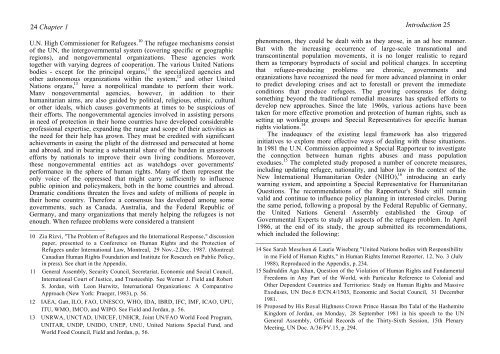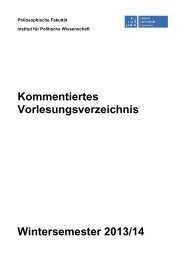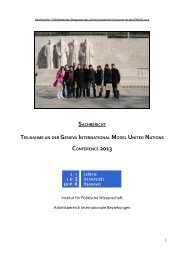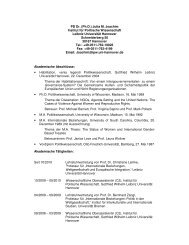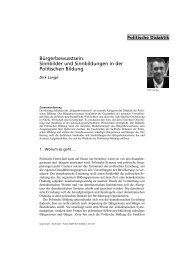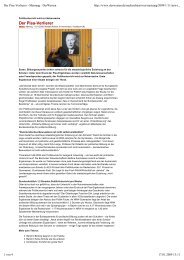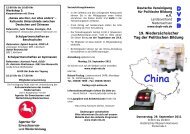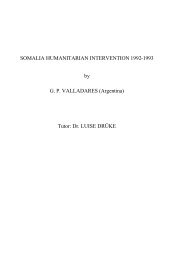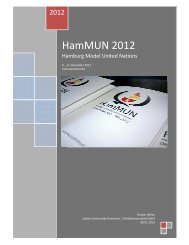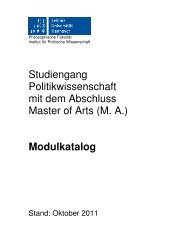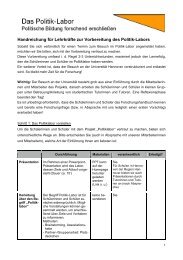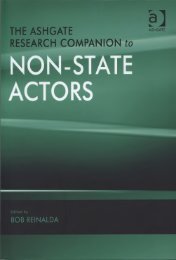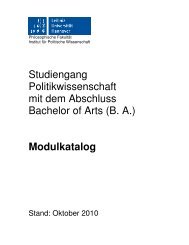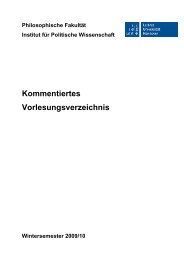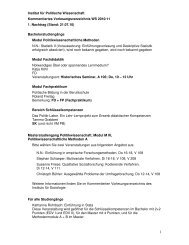Preventive Action for Refugee Producing Situations
Preventive Action for Refugee Producing Situations
Preventive Action for Refugee Producing Situations
You also want an ePaper? Increase the reach of your titles
YUMPU automatically turns print PDFs into web optimized ePapers that Google loves.
24 Chapter 1<br />
U.N. High Commissioner <strong>for</strong> <strong>Refugee</strong>s. 10 The refugee mechanisms consist<br />
of the UN, the intergovernmental system (covering specific or geographic<br />
regions), and nongovernmental organizations. These agencies work<br />
together with varying degrees of cooperation. The various United Nations<br />
bodies - except <strong>for</strong> the principal organs, 11 the specialized agencies and<br />
other autonomous organizations within the system, 12 and other United<br />
Nations organs, 13 have a nonpolitical mandate to per<strong>for</strong>m their work.<br />
Many nongovernmental agencies, however, in addition to their<br />
humanitarian aims, are also guided by political, religious, ethnic, cultural<br />
or other ideals, which causes governments at times to be suspicious of<br />
their ef<strong>for</strong>ts. The nongovernmental agencies involved in assisting persons<br />
in need of protection in their home countries have developed considerable<br />
professional expertise, expanding the range and scope of their activities as<br />
the need <strong>for</strong> their help has grown. They must be credited with significant<br />
achievements in easing the plight of the distressed and persecuted at home<br />
and abroad, and in bearing a substantial share of the burden in grassroots<br />
ef<strong>for</strong>ts by nationals to improve their own living conditions. Moreover,<br />
these nongovernmental entities act as watchdogs over governments'<br />
per<strong>for</strong>mance in the sphere of human rights. Many of them represent the<br />
only voice of the oppressed that might carry sufficiently to influence<br />
public opinion and policymakers, both in the home countries and abroad.<br />
Dramatic conditions threaten the lives and safety of millions of people in<br />
their home country. There<strong>for</strong>e a consensus has developed among some<br />
governments, such as Canada, Australia, and the Federal Republic of<br />
Germany, and many organizations that merely helping the refugees is not<br />
enough. When refugee problems were considered a transient<br />
______________________<br />
10 Zia Rizvi, "The Problem of <strong>Refugee</strong>s and the International Response," discussion<br />
paper, presented to a Conference on Human Rights and the Protection of<br />
<strong>Refugee</strong>s under International Law, Montreal, 29 Nov.-2.Dec. 1987. (Montreal:<br />
Canadian Human Rights Foundation and Institute <strong>for</strong> Research on Public Policy,<br />
in press). See chart in the Appendix.<br />
11 General Assembly, Security Council, Secretariat, Economic and Social Council,<br />
International Court of Justice, and Trusteeship. See Werner J. Field and Robert<br />
S. Jordan, with Leon Hurwitz, International Organizations: A Comparative<br />
Approach (New York: Praeger, 1983), p. 56.<br />
12 IAEA, Gatt, ILO, FAO, UNESCO, WHO, IDA, IBRD, IFC, IMF, ICAO, UPU,<br />
ITU, WMO, IMCO, and WIPO. See Field and Jordan, p. 56.<br />
13 UNRWA, UNCTAD, UNICEF, UNHCR, Joint UN/FAO World Food Program,<br />
UNITAR, UNDP, UNIDO, UNEP, UNU, United Nations Special Fund, and<br />
World Food Council, Field and Jordan, p, 56.<br />
Introduction 25<br />
phenomenon, they could be dealt with as they arose, in an ad hoc manner.<br />
But with the increasing occurrence of large-scale transnational and<br />
transcontinental population movements, it is no longer realistic to regard<br />
them as temporary byproducts of social and political changes. In accepting<br />
that refugee-producing problems are chronic, governments and<br />
organizations have recognized the need <strong>for</strong> more advanced planning in order<br />
to predict developing crises and act to <strong>for</strong>estall or prevent the immediate<br />
conditions that produce refugees. The growing consensus <strong>for</strong> doing<br />
something beyond the traditional remedial measures has sparked ef<strong>for</strong>ts to<br />
develop new approaches. Since the late 1960s, various actions have been<br />
taken <strong>for</strong> more effective promotion and protection of human rights, such as<br />
setting up working groups and Special Representatives <strong>for</strong> specific human<br />
rights violations. 14<br />
The inadequacy of the existing legal framework has also triggered<br />
initiatives to explore more effective ways of dealing with these situations.<br />
In 1981 the U.N. Commission appointed a Special Rapporteur to investigate<br />
the connection between human rights abuses and mass population<br />
exoduses. 15 The completed study proposed a number of concrete measures,<br />
including updating refugee, nationality, and labor law in the context of the<br />
New International Humanitarian Order (NIHO), 16 introducing an early<br />
warning system, and appointing a Special Representative <strong>for</strong> Humanitarian<br />
Questions. The recommendations of the Rapporteur's Study still remain<br />
valid and continue to influence policy planning in interested circles. During<br />
the same period, following a proposal by the Federal Republic of Germany,<br />
the United Nations General Assembly established the Group of<br />
Governmental Experts to study all aspects of the refugee problem. In April<br />
1986, at the end of its study, the group submitted its recommendations,<br />
which included the following:<br />
______________________<br />
14 See Sarah Meselson & Laurie Wiseberg "United Nations bodies with Responsibility<br />
in me Field of Human Rights," in Human Rights Internet Reporter, 12, No. 3 (July<br />
1988), Reproduced in the Appendix, p. 234.<br />
15 Sadruddin Aga Khan, Question of the Violation of Human Rights and Fundamental<br />
Freedoms in Any Part of the World, with Particular Reference to Colonial and<br />
Other Dependent Countries and Territories: Study on Human Rights and Massive<br />
Exoduses, UN Doc.6 E/CN.4/1503, Economic and Social Council, 31 December<br />
1981.<br />
16 Proposed by His Royal Highness Crown Prince Hassan Ibn Talal of the Hashemite<br />
Kingdom of Jordan, on Monday, 28 September 1981 in his speech to the UN<br />
General Assembly, Official Records of the Thirty-Sixth Session, 15th Plenary<br />
Meeting, UN Doc. A/36/PV.15, p. 294.


